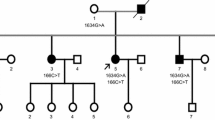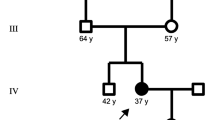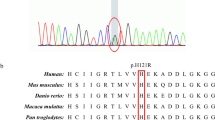Abstract
We report different clinical expression in seven members of a large family with amyotrophic lateral sclerosis (ALS) and the G93D mutation in exon 4 of the Cu/Zn superoxide dismutase (SOD1) gene. The ALS clinical course in the proband showed an unusually fast progression of the disease compared to the paucisymptomatic presentation associated to this mutation in the two previously Italian families described. The remaining mutation carriers did not show the aggressive clinical course displayed by the proband. We selected few genes known to be ALS modifiers searching for genetic variants that could explain the wide phenotypic diversity within the family. Exclusion of causative genes such as TDP43, FUS, PGRN and VAPB was performed too. We believe that this kind of family with contrasting phenotypes of ALS may be considered an excellent human model to study the relationship between a wider genetic profile, including modifier genes, and the clinical expression of the disease. Therefore, the novelty of our approach is also represented by the study of a single family to reproduce a composite structure in which search for possible modifier genes/genetic variants linked to SOD1 mutated.

Similar content being viewed by others
References
Andersen PM, Nilsson P, Ala-Hurula V et al (1995) Amyotrophic lateral sclerosis associated with homozygosity for an Asp90Ala mutation in CuZn superoxide dismutase. Nat Genet 10:61–66
Barber SC, Shaw PJ (2010) Oxidative stress in ALS: key role in motor neuron injury and therapeutic target. Free Radic Biol Med 48:629–641
Battistini S, Giannini F, Greco G et al (2005) SOD1 mutations in amyotrophic lateral sclerosis. Results from a multicenter Italian study. J Neurol 252:782–788
Broom WJ, Russ C, Sapp PC et al (2006) Variants in candidate ALS modifier genes linked to Cu/Zn superoxide dismutase do not explain divergent survival phenotypes. Neurosci Lett 392:52–57
Campo L, Turley H, Han C et al (2005) Angiogenin is up-regulated in the nucleus and cytoplasm in human primary breast carcinoma and is associated with markers of hypoxia but not survival. J Pathol 205:585–591
Corrado L, Battistini S, Penco S et al (2007) Variations in the coding and regulatory sequences of the angiogenin (ANG) gene are not associated to ALS (amyotrophic lateral sclerosis) in the Italian population. J Neurol Sci 258:123–127
Corrado L, Del Bo R, Castellotti B et al (2010) Mutations of FUS gene in sporadic amyotrophic lateral sclerosis. J Med Genet 47:190–194
Figlewicz DA, Orrell RW (2003) The genetics of motor neuron diseases. Amyotroph Lateral Scler Other Mot Neuron Disord 4:225–231
Hand CK, Mayeux-Portas V, Khoris J et al (2001) Compound heterozygous D90A and D96N SOD1 mutations in a recessive amyotrophic lateral sclerosis family. Ann Neurol 49:267–271
Kabashi E, Valdmanis PN, Dion P et al (2008) TARDBP mutations in individuals with sporadic and familial amyotrophic lateral sclerosis. Nat Genet 40:572–574
Kim W, Kim JS, Lee KS, Gwoun YJ, Kim JM, Lee KH (2007) Anticipation and phenotypic heterogeneity in korean familial amyotrophic lateral sclerosis with superoxide dismutase 1 gene mutation. J Clin Neurol 3:38–44
Kwiatkowski TJ Jr, Bosco DA, Leclerc AL et al (2009) Mutations in the FUS/TLS gene on chromosome 16 cause familial amyotrophic lateral sclerosis. Science 323:1205–1208
Lambrechts D, Lafuste P, Carmeliet P, Conway EM (2006) Another angiogenic gene linked to amyotrophic lateral sclerosis. Trends Mol Med 12:345–347
Leverenz JB, Yu CE, Montine TJ et al (2007) A novel progranulin mutation associated with variable clinical presentation and tau, TDP43 and alpha-synuclein pathology. Brain 130:1360–1374
Luigetti M, Madia F, Conte A et al (2008) SOD1 G93D mutation presenting as paucisymptomatic amyotrophic lateral sclerosis. Amyotroph Lateral Scler 31:1–4
Millecamps S, Salachas F, Cazeneuve C et al (2010) SOD1, ANG, VAPB, TARDBP, and FUS mutations in familial amyotrophic lateral sclerosis: genotype-phenotype correlations. J Med Genet 47:554–560
Miller SA, Dykes DD, Polesky HF (1988) A simple salting out procedure for extracting DNA from human nucleated cells. Nucleic Acid Res 16:1215
Nakamura M, Yamabe H, Osawa H et al (2006) Hypoxic conditions stimulate the production of angiogenin and vascular endothelial growth factor by human renal proximal tubular epithelial cells in culture. Nephrol Dial Transplant 21:1489–1495
Restagno G, Lombardo F, Ghiglione P et al (2007) HFE H63D polymorphism is increased in patients with amyotrophic lateral sclerosis of Italian origin. J Neurol Neurosurg Psychiatry 78:327
Restagno G, Lombardo F, Sbaiz L et al (2008) The rare G93D mutation causes a slowly progressing lower motor neuron disease. Amyotroph Lateral Scler 9:35–39
Ricci C, Battistini S, Cozzi L et al (2010) Lack of association of PON polymorphisms with sporadic ALS in an Italian population. Neurobiol Aging (in press)
Robberecht W, Aguirre T, Van Den Bosch L, Tilkin P, Cassiman JJ, Matthijs MG (1996) D90A heterozygosity in the SOD1 gene is associated with familial and apparently sporadic amyotrophic lateral sclerosis. Neurology 47:1336–1339
Rosen DR, Siddique T, Patterson D et al (1993) Mutations in Cu/Zn superoxide dismutase gene are associated with familial amyotrophic lateral sclerosis. Nature 362:59–62
Sau D, De Biasi S, Vitellaro-Zuccarello L et al (2007) Mutation of SOD1 in ALS: a gain of a loss of function. Hum Mol Genet 16:1604–1618
Slowik A, Tomik B, Wolkow PP et al (2006) Paraoxonase gene polymorphisms and sporadic ALS. Neurology 67:766–770
Sreedharan J, Blair IP, Tripathi VB et al (2008) TDP-43 mutations in familial and sporadic amyotrophic lateral sclerosis. Science 319:1668–1672
Stathopulos PB, Rumfeldt JA, Karbassi F et al (2006) Calorimetric analysis of thermodynamic stability and aggregation for apo and holo amyotrophic lateral sclerosis-associated Gly-93 mutants of superoxide dismutase. J Biol Chem 281:6184–6193
Subramanian V, Crabtree B, Acharya KR (2008) Human angiogenin is a neuroprotective factor and amyotrophic lateral sclerosis associated angiogenin variants affect neurite extension/pathfinding and survival of motor neurons. Hum Mol Genet 17:130–149
Sutedja NA, Sinke RJ, Van Vught PW et al (2007) The association between H63D mutations in HFE and amyotrophic lateral sclerosis in a Dutch population. Arch Neurol 64:63–67
Ticozzi N, Leclerc AL, Keagle PJ et al (2010) Paraoxonase gene mutations in amyotrophic lateral sclerosis. Ann Neurol 12(68):102–107
Valdmanis PN, Rouleau GA (2008) Genetics of familial amyotrophic lateral sclerosis. Neurology 70:144–152
Valentino F, Bivona G, Butera D et al (2010) Elevated cerebrospinal fluid and plasma homocysteine levels in ALS. Eur J Neurol 17:84–89
Vance C, Rogelj B, Hortobágyi T et al (2009) Mutations in FUS, an RNA processing protein, cause familial amyotrophic lateral sclerosis type 6. Science 323:1208–1210
Wills AM, Cronin S, Slowik A et al (2009) A large-scale international meta-analysis of paraoxonase gene polymorphisms in sporadic ALS. Neurology 73:16–24
Zetterberg H, Jacobsson J, Rosergren L, Blennow K, Andersen PL (2008) Association of APOE with age at onset of sporadic amyotrophic lateral sclerosis. J Neurol Sci 273:67–69
Zoccolella S, Bendotti C, Beghi E, Logroscino G (2010) Homocysteine levels and amyotrophic lateral sclerosis: a possible link. Amyotroph Lateral Scler 11:140–147
Acknowledgments
The authors would like to thanks the index patient and her family for participation in this study and the “Fondazione Alberto Monti” for supporting LM and part of this study.
Author information
Authors and Affiliations
Corresponding author
Rights and permissions
About this article
Cite this article
Penco, S., Lunetta, C., Mosca, L. et al. Phenotypic Heterogeneity in a SOD1 G93D Italian ALS Family: An Example of Human Model to Study a Complex Disease. J Mol Neurosci 44, 25–30 (2011). https://doi.org/10.1007/s12031-010-9480-4
Received:
Accepted:
Published:
Issue Date:
DOI: https://doi.org/10.1007/s12031-010-9480-4




